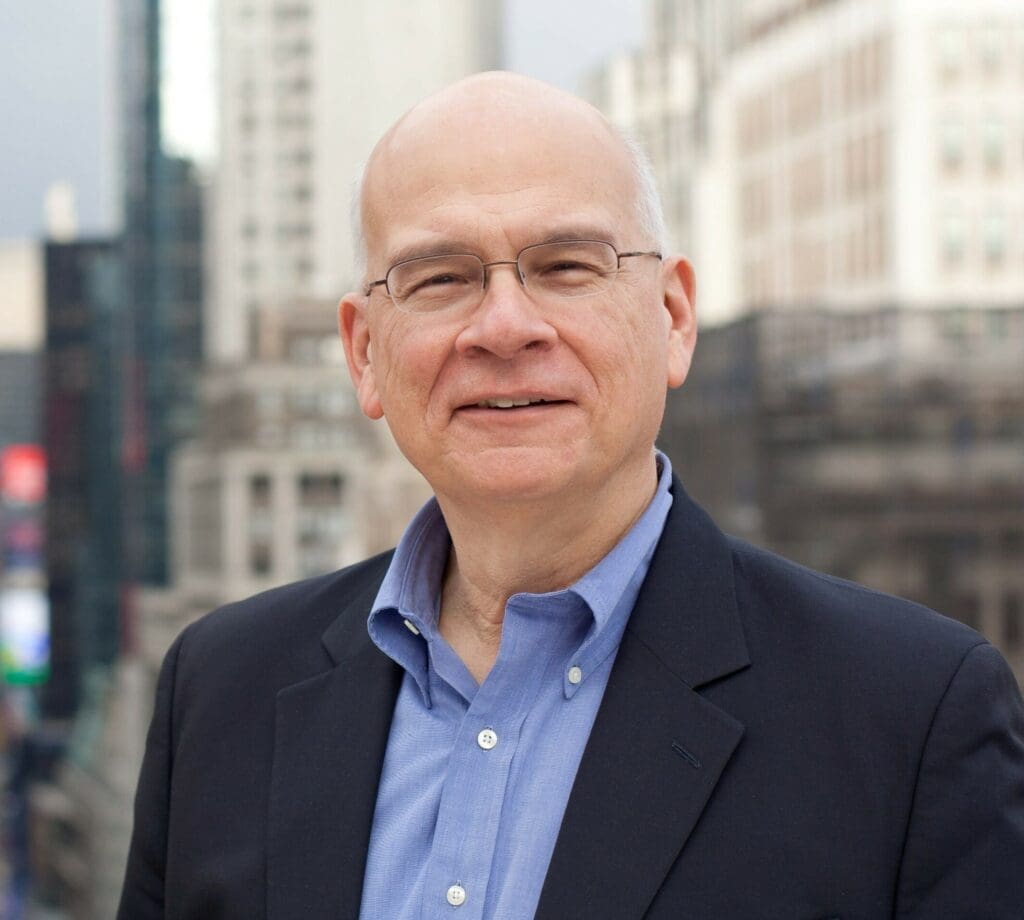A
Offended by Forgiveness
After the 2014 deaths of Michael Brown in Ferguson, Missouri, and Eric Garner in New York City, a new movement for racial justice emerged, especially embodied by a new loose network called Black Lives Matter. “This ain’t your grandfather’s civil rights movement,” said rapper Tef Poe. This one, he said, would be much angrier. At an October protest in Ferguson, street activists heckled and turned their backs on the president of the NAACP. Unlike the older civil rights protesters, journalists on the ground in Ferguson reported that the activists were “hurling insults and curses” at police.
After relatives of the nine African Americans killed in Charleston, South Carolina, publicly said to the shooter, Dylann Roof, “I forgive you,” a Washington Post opinion piece by Stacey Patton responded with the headline “Black America Should Stop Forgiving White Racists.”
“The parade of forgiveness is disconcerting to say the least,” she wrote. The expectation and admiration for black people’s forgiveness “is about protecting whiteness, and America as a whole. . . . When black forgiveness is the means for white atonement, it enables white denial about the harms that racist violence creates.”
Barbara Reynolds, a septuagenarian who had marched in the civil rights protests of the 1960s, wrote a counterpoint essay in the same newspaper. She said that the original movements led by Martin Luther King Jr and Nelson Mandela were marked by “the ethics of love, forgiveness and reconciliation,” and they triumphed because of “the power of the spiritual approach.” While admiring BLM’s “cause and courage,” Reynolds concluded that love and forgiveness “are missing from this movement.” She argued that forgiveness disarms the oppressors and wins over many of their supporters, weakening the system. “If you get angry,” she quotes Andrew Young as saying, “it is contagious and you end up acting as bad as the perpetrators.”
But Stacey Patton, representing this younger generation of activists, was having none of it. Many black Christians had believed “that displays of morality rooted in forgiveness would force white America to leave behind its racist assumptions.” But, Patton argued, “our constant forgiveness [only] perpetuates the cycle of attacks and abuse.”
Three years after the emergence of this new racial justice movement, Harvey Weinstein’s sexual abuse case set off another mass movement for justice: #MeToo. Almost immediately the issue of forgiveness came to the fore. Danielle Berrin wrote an article titled, “Should We Forgive the Men Who Assaulted Us?” in The New York Times. She concluded that she was not ready to forgive her assailant but held out the possibility that substantial repentance on his part, accompanied by “restitution made publicly as well as privately,” might move her to forgive.
Other voices were less open. The supposed moral obligation of forgiveness was seen as an instrument by which those in power maintained their position. One comment on Berrin’s article vividly summarized a growing view:
The notion that the victims of crime, oppression and sexual assault must forgive their oppressors piles more oppression and harshness on the victim. . . . Insisting that she forgive . . . plays into the sickness of patriarchal misogynistic male-supremacist religions that blame women. Forgiveness is overrated. It heals [neither] the body or mind. . . . Let the criminal ask his gods, if there be any, for forgiveness. . . . Instead of talking about victims must forgive, we should be talking about tattooing the words “Rapist” or “Sexual Predator” on the foreheads of the criminals—this would actually help make women and children safer.
Today, after the renewal of the racial justice movement in the wake of George Floyd’s death, the emphasis on guilt and justice is ever more on the rise and the concept of forgiveness seems, especially to the younger generation, increasingly problematic. What are the influences that are making forgiveness problematic in our culture?
Our Therapeutic Culture
The first factor is the therapeutic culture. As Philip Rieff and Charles Taylor have both shown, our culture has taken a strongly inward turn. While all other cultures have stressed the importance of community and the need to forge a personal identity that negotiates and aligns with the common good, modernity stresses looking inward to forge one’s own identity based on our desires, and then moving outward to demand that society honour our individual identity and interests.
A recent interview with an actress in Global Heroes, a magazine insert in The Wall Street Journal, perfectly exemplifies the therapeutic turn. When asked, “What is one good choice that everyone can make to improve the world around them?” she answered, “Look for your own truth, LIVE your own truth instead of repeating anyone else’s.” She elaborated: “What’s crucial to me is to make my audience . . . [question] old beliefs.” She counsels her fans to engage in a daily practice of asking, “What do I need today?” and then to go and get it.
Gregory Jones sees this therapeutic turn as perhaps the greatest reason that we have such “impoverished contemporary understandings and practices of forgiveness in modern western culture. . . . If all that matters is individual autonomy, then forgiveness and reconciliation—which are designed to foster and maintain community—are of little importance.” Today, Jones argues, forgiveness is either discouraged as imposing a moral burden on the person or, at best, it is offered as a way of helping yourself acquire more peaceful inner feelings, of “healing ourselves of our hate.”
In contrast, the Bible orients us toward “Christian life embodied in eschatological community.” The church is to be a foretaste of the future world of love and perfect community under the lordship of Jesus. Our sin inclines us to behaviour that regularly weakens and breaks relationships, but through the Spirit we are given the ability to realize—partially, never fully in this life—something of the beauty and joy of those future relationships through practices and disciplines of forgiveness and reconciliation now.
In October of 2006 a gunman took hostages in a one-room Amish schoolhouse at Nickel Mines, Pennsylvania. He shot ten children ages seven to thirteen, five of whom died, and then he committed suicide. Within hours members of the Amish community visited both the killer’s immediate family and his parents, each time expressing sympathy for their loss. The Amish uniformly expressed forgiveness of the murderer and his family. The forgiveness and love shown toward the shooter and his family amazed many. Numerous voices called Americans to emulate the Amish and become more forgiving.
Four years later a group of scholars wrote about the incident. One of their main conclusions was that our secular culture is not likely to produce people who can handle suffering the way the Amish did. They argued that the Amish ability to forgive was based on two things. First, at the heart of their faith was a man dying for his enemies. Through communal practices this self-sacrificing figure was seen, sung, believed, rehearsed, and celebrated constantly. For Jesus to give his life and forgive his tormentors was an act of enormous love and spiritual strength, and so within their worldview orientation, the Amish saw forgiveness as the greatest gift and virtue. In American culture, in which church attendance is declining, this view of Christ is slipping more and more out of daily view.
That led to the authors’ other point. They argued that forgiveness is a form of “self-renunciation,” giving up your perfect right to pay back to the person what they did to you. This directly opposes how Americans are now taught to think and live. As we saw in the language of the interviewed actress, we are taught self-realization and assertion, that your happiness, interests, and needs always come first. A culture promoting self-maximization, one that pits self-fulfillment against self-sacrifice, will usually produce revenge or withdrawal as a response to any mistreatment, while a counterculture teaching self-renunciation will much more likely produce forgiveness as a response. “Most of us have been formed by a culture that nourishes revenge and mocks grace,” the authors conclude. In such a therapeutic culture, forgiveness is seen as self-hating, and revenge and anger will be seen as more authentic, as long as you do not let the anger become too unpleasant for your inner psychological well-being.
Religion Without Grace
The second influence impoverishing the modern practice of forgiveness is a rising shame and honour culture that some have called a new secular religion.
According to Bradley Campbell and Jason Manning, the therapeutic culture has converted us into a collection of “self-actualizers,” whose primary concern is to get respect and affirmation of one’s own identity. But the therapeutic culture also taught us to think of ourselves as individuals needing protection from society and from various groups with power who oppress us. So, ironically, we have developed “a shame and honor culture of victimhood.” Greater honour and moral virtue are assigned to people the more they have been victimized and oppressed by society or others in power. So the further down the existing social ladder one is, the greater the possibilities for honour.
In the new culture, companies, institutions, and governing agencies are now tasked not with treating all individuals equally, but with the moral obligation to defend victims—those who have been oppressed by the powerful. This provides a second ring of honour in the emerging culture. While highest honour comes to victims, it secondarily comes to defenders of victims. So now there is no better way for a business, school, or government to gain honour (and, frankly, to divert attention from their own wealth and power) than to mercilessly punish anyone seen as a victimizer.
Campbell and Manning’s critique is that this new honour society—also called “cancel culture”—ends up valuing fragility over strength, creating a society of constant, good-versus-evil conflict over the smallest issues as people compete for status as victims or as defenders of the victim. It atrophies our ability to lovingly overlook slights (cf. 1 Peter 4:8: “Love covers a multitude of sins”). But most of all, it sweeps away the very concept of forgiveness and reconciliation. Forgiveness is seen now as radically unjust and impractical, as short-circuiting the ability of victims to gain honour and virtue as others rise to defend them.
Forgiveness is seen now as radically unjust and impractical, as short-circuiting the ability of victims to gain honour and virtue as others rise to defend them.
It’s no wonder that this culture quickly becomes littered with enormous numbers of broken and now irreparable relationships. Politics itself becomes a new kind of religion, one without any means of acquiring redemption or forgiveness. Rather then seeing some people as right and others as mistaken, they are now regarded as the good and the evil, as true believers or heretics.
Some claim that this new secular religion was inevitable because Western culture with its relativism about moral truth leaves people feeling morally empty and isolated and leads inevitably to social fragmentation. As Émile Durkheim argued, no culture can create solidarity without a “conscience collective.” That is, a set of shared moral norms that bind us together and are grounded in something sacred—a set of values that are incommensurable, to be held and defended whatever the cost, not to be questioned. Durkheim saw that religion had always been the ordinary way a conscience collective was formed, and recognized the difficulties secular cultures had in grounding their moral beliefs in something strong and unquestionable enough to unite people.
In light of Durkheim’s analysis, the sacralizing of social justice is not a surprise. The Western ideas of human rights, universal benevolence of the poor, and social justice have deep roots in biblical religion. That is why they arose in the West, and why Christians can so often be allies with secular people who are working for racial and economic justice. But when Christians rooted their moral norms in the divine justice of God, that also meant grounding them in the divine mercy of God. So patience, mercy, and forgiveness of wrongdoers has always been part of the Christian ethic. But today’s honour culture does not root its moral absolutes in the divine. Some, such as Samuel Moyn, admit that secular progressive values have historically Christian roots but argue that we now see them as self-evident and in need of no connection to religious doctrine. In other words, we no longer ground our values in the sacred. We simply treat the values themselves as sacred.
But this leads to at least three bad outcomes. The first is the arbitrariness of the values. “It is evil and wrong to speak to person X in this way.” The response is, “Who says it is wrong?” The only possible answer is a power move. “It’s wrong because we say so.” The second is the inconsistency and incoherence of the approach. Its proponents hold their values as being beyond debatable while at the same time insisting that all others’ norms are socially constructed. The third is the lack of provision for mercy and forgiveness. When the moral norms are detached from faith in a just God, it detaches them also from faith in a merciful and forgiving God. In such a “secular religion,” deviation from norms is simply unforgiveable.
Social media has only accentuated and enabled this this movement toward a graceless culture. As Alan Jacobs has written,
When a society rejects the Christian account of who we are, it doesn’t become less moralistic but far more so, because it retains an inchoate sense of justice but has no means of offering and receiving forgiveness. The great moral crisis of our time is not, as many of my fellow Christians believe, sexual licentiousness, but rather vindictiveness. Social media serve as crack for moralists: there’s no high like the high you get from punishing malefactors. But like every addiction, this one suffers from the inexorable law of diminishing returns. The mania for punishment will therefore get worse before it gets better.
No Future Without Forgiveness
Our culture is losing the resources for forgiveness and reconciliation. Many would say this a good thing, that forgiveness is a form of psychologically unhealthy self-loathing, and that it is also a way that oppressors maintain their power over victims. Nevertheless, we have from three people—people representing groups who were egregiously oppressed in the twentieth century—ringing, insistent calls to forgive. Those three people are Hannah Arendt, Martin Luther King Jr., and Desmond Tutu.
Tutu, speaking as a black South African who grew up under the horror of apartheid, insists that “without forgiveness there is no future.” He rejected the Nuremburg Trials model of dealing with war crimes and instead made the case for his Truth and Reconciliation Commission in South Africa, which offered amnesty and forgiveness for any perpetrators of violence who would come forward and publicly confess the full truth of what they had done. He argued that the alternative to forgiveness in South Africa would have been the cycle of violence we saw in the Balkans after the breakup of Yugoslavia.
Arendt, a Jewish political philosopher writing after the Holocaust, said,
Without being forgiven, released from the consequences of what we have done, our capacity to act would, as it were, be confined to one single deed from which we could never recover; we would remain the victims of its consequences forever, not unlike the sorcerer’s apprentice who lacked the magic formula to break the spell.
The New York Times columnist Elizabeth Bruenig restates Arendt’s argument:
There were centuries and centuries . . . in which the Christian notion of forgiveness was not a part of anybody’s culture—the unconditional starting afresh, forgiving, forgetting, and how that practice ought to work. . . . But I think it’s the only way civil society really hangs together. If we continually deny people the opportunity to have an identity apart from their punish-identity, then you’re inviting them to . . . permanently inhabit that failure. In other words, not to change. And even if they do change because they are good-hearted, they will not be able to reconcile with anyone as long as they are presented with an identity that is attached to their failure.
And Martin Luther King wrote, “He who is devoid of the power to forgive is devoid of the power of love. . . .We can never say, ‘I will forgive you, but I won’t have anything further to do with you.’ Forgiveness means reconciliation, and coming together again.” Each of these thinkers offers compelling reasons that to be a healthy society—one in which broken relationships can be regenerated—we must learn and value forgiveness.
The most obvious contribution that the church could make is to recover its own theology and practice of forgiveness and become a true counterculture that can serve as a witness to the world. Arendt goes so far as to say that “the Discoverer of the role of forgiveness in the realm of human affairs was Jesus of Nazareth. The fact that he made this discovery in a religious context and articulated it in religious language is no reason to take it any less seriously in a strictly secular sense.” Arendt is right that secular people can use forgiveness to great benefit, but Christian faith provides many more resources for it. It is our responsibility to renew the biblical teaching on forgiveness and to show the world the unique resources both Christian belief and Christian community give us for it.
Here is a brief overview of what those teachings and resources are.
Forgiveness in Christianity is a set of practices—including practices of prayer (Matthew 6:12, 14–15; Mark 11:25) and of community (Matthew 5:21–24; 18:15–17). It is not, therefore, primarily and originally an emotion. Forgiveness is granted before it is experienced. The practices can slowly shrink the internal anger over time, and that is a great good to be expected, but forgiveness is practiced before felt, not felt before practiced.
Forgiveness is always a form of voluntary suffering that brings about a greater good. When you are wronged, the perpetrator owes you. It may be literal and financial, but in any case he or she has wrongfully robbed you of some good, whether reputation or relationship or health or of something else. To forgive is to deny oneself revenge (Romans 12:17–21). It is a commitment to not try to exact repayment from them by inflicting on them the things they did to you. Therefore forgiveness is always costly to the forgiver, but the profits—at the least within your heart and at best in the restoration of relationship—outweigh the cost.
Forgiveness practices have an upward, inward, and outward aspect, and each is crucial.
Upward: Embracing divine forgiveness. Christians live only by God’s free forgiveness (Matthew 18:21–35), and they know that God will eventually square all accounts (Romans 2:1–11). This means that Christians have no ultimate warrant to revenge, have insufficient knowledge to know what any individual actually deserves, and have the comfort of knowing that no one in the end will get away with anything. So Christians don’t have the right, the ability, or the need to bring God’s judgment down on others. Every time we pray, Jesus tells us through the Lord’s Prayer that we are to immerse ourselves in the remembrance of our free forgiveness through the costly sacrifice of Jesus so that we can freely forgive others.
Inward: Granting inward forgiveness. Christians inwardly give up the desire to get even. To forgive is to give the perpetrator a gift they do not in any way deserve. While the perpetrator has been sinfully unfair to you, now you are mercifully unfair to them. You give them something not fair—it is better than fair. It is mercy. This is “attitudinal forgiveness” that, as Mark 11:25 (cf. Matthew 6:12) shows, is something you can do whether or not they have repented. It is a promise not to constantly bring the wrong up to others, to yourself internally, or to the perpetrator for the purpose of payback. It is a commitment to refrain from replaying the video of the wrongdoing in order to continue to nurse your grudge and to keep rooting for the person’s unhappiness. It is something you can do regardless of the behaviour of the perpetrator, for it is done in and from the heart (Matthew 18:35).
Outward: Forging a reconciled relationship. Finally, the ultimate goal of forgiveness is a reconciled relationship. Martin Luther King Jr. was right when he argued that to say, “I forgive you but I don’t want to have anything to do with you” is a contradiction in terms. You have not embraced your divine forgiveness nor granted inward forgiveness if you refuse a reconciled relationship. To refuse to begin work on a reforged trust relationship—something that takes a great deal of time and effort—is actually a way to get revenge.
Reconciliation has been called “transacted forgiveness.” Some point to Luke 17:3–4, which says that we are to forgive only if people repent. They use this to deny the need for inward, attitudinal forgiveness until the perpetrator asks for it. But this confusing of the two aspects of forgiveness undermines them both. If you cannot forgive internally, then when you go to seek repentance from the person, you are likely to do so in an angry, punishing way that only widens the gap between you. If you do forgive internally, this does not mean you do not have to approach the perpetrator over what was done. Both mistakes—“If you’ve forgiven you don’t need to go to her” and “If she doesn’t repent you don’t have to forgive her”—short-circuit the redemptive possibilities in the full practice of Christian forgiveness. Forging a new relationship—after forgiveness—can and should include the pursuit of justice. But only if you first internally forgive will you be able refrain from going beyond the terms of justice to revenge.
Forgiveness requires two inner resources that the experience of the gospel gives us for a life of forgiveness: First, realistic humility about your sin. You can only stay bitter toward someone if you feel superior, if you feel that you would never do anything like they did. Those who won’t forgive show they have not accepted the fact of their own sinfulness. When Paul says he is the “chief of sinners” he is saying that he is as capable of sin as the worst criminals are. To remain unforgiving means you remain unaware of your own profound, perpetual need for forgiveness.
But this realistic humility must be concomitant with joyful assurance of your acceptance in Christ. You can’t be gracious to someone if you are mainly dependent on the approval of others to shore up your weak sense of self-worth. If you know God’s love and forgiveness, then there is a limit to how deeply another person can hurt you. He or she can’t touch your real identity, wealth, and significance. The more we rejoice in our own forgiveness, the quicker we will be to forgive others.
Forgiveness is always a form of voluntary suffering that brings about a greater good.
Miroslav Volf puts it this way:
Forgiveness flounders because I exclude the enemy from the community of humans even as I exclude myself from the community of sinners. But no one can be in the presence of the God of the crucified Messiah for long without overcoming this double exclusion—without transposing the enemy from the sphere of monstrous inhumanity into the sphere of shared humanity and herself from the sphere of proud innocence into the sphere of common sinfulness. When one knows that the torturer will not eternally triumph over the victim, one is free to rediscover that person’s humanity and imitate God’s love for him. And when one knows that God’s love is greater than all sin, one is free to see oneself . . . and so rediscover one’s own sinfulness.
When God revealed his glory to Moses, he said that while “forgiving wickedness,” nonetheless “he does not leave the guilty unpunished” (Exodus 34:6–7). Not until Jesus do we see how God can be both completely just and forgiving through his atonement (1 John 1:7–9). In the cross God satisfied both justice and love. God was so just and desirous to judge sin that Jesus had to die, but he was so loving and desirous of our salvation that Jesus was glad to die. So we are also required to forgive in a way that honours justice, just as God’s forgiveness does. “If your brother sins, rebuke him, and if he repents, forgive him” (Luke 17:3). Since God forgives us yet in a way that honours justice, so we should also forgive in a way that honours justice. As Don Carson once wrote, “Christians are called to abandon bitterness, to be forbearing, to have a forgiving stance even where the repentance of the offending party is conspicuous by its absence; on the other hand, their God-centered passion for justice, their concern for God’s glory, ensure that the awful odium of sin is not glossed over.”
The Christian Counterculture
As I have already noted, the main way Christians can be a resource to the broader culture is by restoring the church to being a well-known community of forgiveness and reconciliation. It may be in the practices of forgiveness that we can best see the truth of Bonhoeffer’s statement: “Our community with one another [in Christ] consists solely in what Christ has done to both of us. Christian brotherhood is a spiritual and not a human reality. In this it differs from all other communities.”
Those who won’t forgive show they have not accepted the fact of their own sinfulness.
Christians in community are to never give up on one another, never give up on a relationship, never “write off” another believer and have nothing to do with them. We must never tire of forgiving (and/or repenting!) and seeking to repair our relationships. Matthew 5:23–26 tells us we should go to someone if we know they have something against us. Matthew 18:15–20 says we should approach someone if we know that we have something against them. In short, if any relationship has cooled off or has weakened in any way—it is always your move. It doesn’t matter who started it. God always holds you responsible to reach out to repair a tattered relationship. A Christian is responsible to begin the process of reconciliation, regardless of how the distance or the alienation began.
And when in the hard work of reconciliation we ask why there are so many conflicts between Christians, let us remember that unreconciled relationships within the church are inevitable because the church is such a wonderful, supernaturally created community. Says Carson,
The reason there are so many exhortations in the New Testament for Christians to love other Christians is because . . . the church itself is not made up of natural “friends.” It is made up of natural enemies. What binds us together is not common education, common race, common income levels, common politics, common nationality, common accents, common jobs, or anything else of that sort. Christians come together not because they form a natural collocation, but because they have all been saved by Jesus Christ and owe him a common allegiance. In this light we are a band of natural enemies who love one another for Jesus’ sake. That is the only reason why John 13:34–35 makes sense when Jesus says: “A new command I give you—Love one another as I have loved you.”’ . . . Christian love will stand out and bear witness to Jesus because it is a display, for Jesus’ sake, of mutual love among social incompatibles.
We must never give up on each other or on the supernatural potential of Christian community. Jesus has brought “incompatibles” together. No wonder we often fight! We must strive to hold ourselves accountable to practice forgiveness and reconciliation. Our mutual love for one another is how the world will see who Jesus is.







